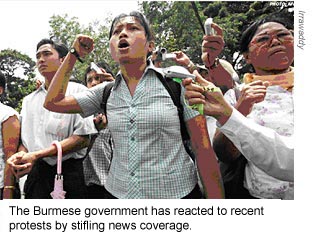New York, September 14, 2007— The Committee to Protect Journalists is concerned by reports that several Burmese journalists have recently had their telephone services cut by government authorities.
According to the Burma Media Association and Burmese exile-run news sources, a number of reporters have recently experienced either permanent or recurring cuts of their cell phone services. Those affected include Agence France-Presse reporter Hla Hla Htay and freelancer May Thingyan Hein, who recently won a Knight International Journalism Award.
On September 8, Directorate of Military Engineers officials arrived at the main national telecommunication complex, located on Bo Soon Pat Street in downtown Rangoon, according to information received by the BMA. Soon after, several National League for Democracy opposition politicians, including party spokesman Myint Thein, had their mobile service cut.
Since then, growing numbers of journalists and news sources have complained about blocks on their phones, according to Burmese exile-run media groups who had recently communicated with the reporters.
“Censorship in Burma takes many forms,” said CPJ Executive Director Joel Simon. “First, the authorities try to stop coverage of fuel protests by harassing and assaulting reporters, now they block their phones. Journalists have an absolute right to communicate. The government must restore full telephone services immediately.”
Burma’s authoritarian government has cracked down hard on local media coverage of the protests, which were the largest expression of popular dissent for over a decade in the tightly controlled country. Pro-government groups and plainclothes police have in recent weeks harassed and assaulted local journalists, in one case, confiscating one Reuters reporter’s cameras.
Soon after protests started August 19, the government also ordered a 10-day blackout on local news coverage of the events. More recently, the government has allowed news stories on the protests, with the government-controlled media portraying the incidents as a threat to national security, according to an informal CPJ survey of Burma’s local press.
Several foreign journalists based in Thailand who spoke with CPJ have been denied journalist visas in the wake of the unrest. Government authorities have also ordered rolling blackouts of the Internet, in apparent reaction to the flow of photos and video footage of the protests which have appeared in both the Burmese exile-run and foreign media.
Videos and day-by-day print reports about the protests have been published by several Burmese exile-run publications, including particularly detailed accounts at agency Mizzima News and Irrawaddy, an online newsmagazine. Video clips of the protests and the arrests of demonstrators have also been posted on the popular video-sharing site YouTube.
